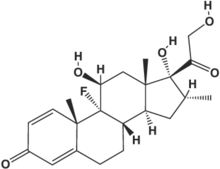Clinical Question: Does a single oral dose of dexamethasone improve outcomes in patients with mild croup?
Setting: Emergency department
Study Design: Randomized controlled trial (double-blinded)
Allocation: Concealed
Synopsis: The authors identified children presenting with less than 72 hours of a seal-like, barking cough and a low score (2 or less) on a validated 17-point croup measure. The score assigns points for inspiratory stridor, retractions, impaired air entry, cyanosis, and impaired consciousness. Children with signs of epiglottitis, bacterial tracheitis, foreign body, chronic pulmonary disease, recent varicella, and recent steroid treatment were excluded.
The children were assigned randomly (allocation concealed) to receive 0.6 mg per kg of dexamethasone or placebo, with a maximum total dose of 20 mg. The placebo had an appearance and flavor similar to the active drug. Parents were telephoned on days 1, 2, 3, 7, and 21. The primary outcomes (based on the telephone interview) were return to a health care professional within seven days of enrollment and continued symptoms on days 1, 2, and 3. Analysis was by intention to treat. A strength of the study was the detailed cost analysis, considering costs to the government that pays for medical care and to the family members who have to care for the child and perhaps miss work.
Of the 2,901 patients initially assessed for eligibility, 720 met inclusion criteria and were randomized. Follow-up was excellent (97 percent at three days). Children who received dexamethasone were less likely to return for care within seven days (7.3 versus 15.3 percent for placebo; number needed to treat = 13). This benefit was consistent across groups, although it appeared to be greatest in younger children and those with spasmodic croup symptoms. Children receiving dexamethasone had lower croup scores on day 1, although this advantage disappeared by day 3, at which time most patients had fully recovered whether or not they were treated with steroids. Other benefits included improved sleep, reduction in parental anxiety, and reduced cost. No significant adverse events were attributed to the dexamethasone.
Bottom Line: A single oral dose of dexamethasone (0.6 mg per kg) improves short-term symptoms and reduces the likelihood that a child with mild croup will have to return for additional care. The dexamethasone was well tolerated, and considering the well-documented benefits of steroids in children with more severe disease, steroids in some form should be considered for most children with croup. (Level of Evidence: 1b)
Study Reference: Bjornson CL, et al. A randomized trial of a single dose of oral dexamethasone for mild croup. N Engl J Med September 23, 2004;351:1306-13.
Used with permission from Ebell M. Single oral dose dexa-methasone effective for even mild croup. Accessed online November 1, 2004, at: http://www.InfoPOEMs.com.
COPYRIGHT 2005 American Academy of Family Physicians
COPYRIGHT 2005 Gale Group



